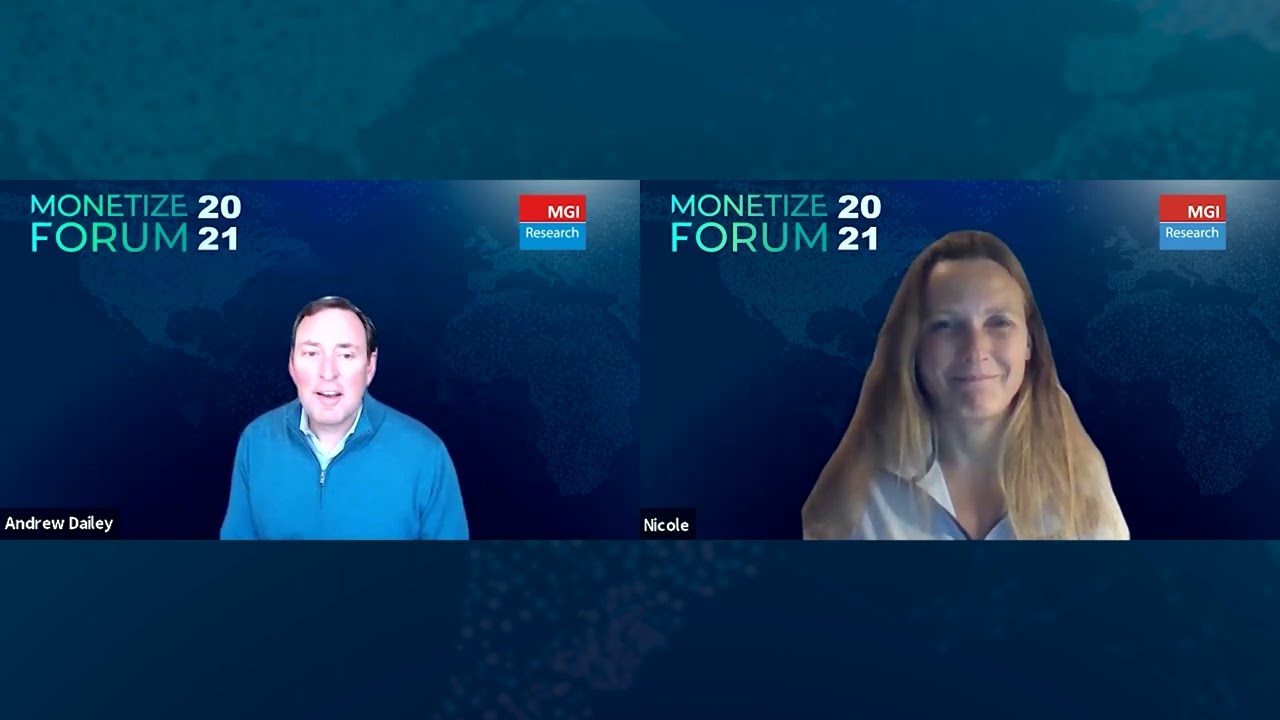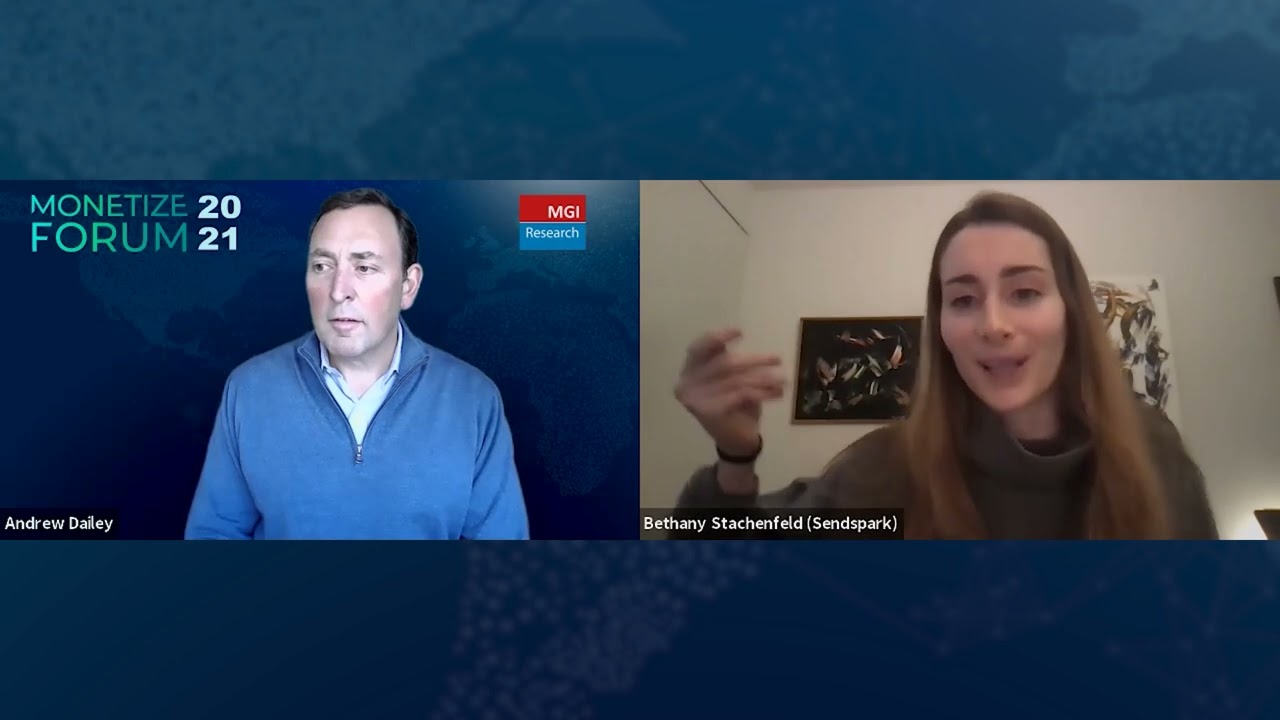Satisfying the ever-evolving demands and expectations of today’s customers means reimagining your business to support more than just subscription or usage-based billing. MGI Research analyst Andrew Dailey spoke with Dennis Wall, CEO of BillingPlatform, at the 2021 Monetize Forum about his experiences in helping companies both mid-size and large attain the flexibility to respond to customers today and in the future. Their conversation covers the pain points that necessitate transformation as well as those that often come up in the process itself—and strategies for avoiding and minimizing them.
Key Issues
What is “the relationship economy?”
How can companies combat the fatigue and frustrations of major transformational endeavors?
Which important considerations are often neglected in a monetization effort?
Guest Profile
Dennis is the CEO of BillingPlatform. Previously, he founded Cloud Sherpas, a leading cloud technology and advisory firm acquired by Accenture in 2015. Before that, Dennis co-founded OKERE, a global cloud services provider acquired by Fujitsu in 2007. Dennis brings over 20 years of experience enabling companies to realize transformational change through innovative software and services solutions.
Andrew Dailey
Welcome everyone. I’m Andrew Dailey of MGI Research, and this session is “Beyond Billing: The Relationship Economy.” I’m joined by the CEO of BillingPlatform, Dennis Wall. We’re delighted to have Dennis back on the Monetize Forum stage. Welcome, Dennis.
Dennis Wall
Thank you, Andrew, and thanks to MGI.
Andrew Dailey
Let’s jump right into it. First, for those who don’t know BillingPlatform, give us a sense of your business.
Dennis Wall
Sure. I know I don’t have to tell you this, Andrew, but recurring revenue relationships are becoming the norm, and with them, so are the complexities of managing those relationships. You can have a simple type of recurring revenue relationship, like a Netflix subscription for example. But then, if we look at what the insurance industry is doing with autos, you can pay for your auto insurance by the mile now. We even see the same thing with bike-sharing in some of the major cities around the world.
Our cloud-based platform gives enterprises the flexibility to support any kind of business relationship from quote-to-cash. It starts with our core product, BillingCloud, where we can support literally any kind of billing model, whether that’s usage, subscription, a transaction, or really any variation thereof. Additionally, we’ve continued to expand our capabilities from that core to cover billing, revenue recognition, collections, and portals. An independent analysis found that one of our customers is realizing annual savings of between three to nine million dollars due to greater operational efficiencies combined with their ability to get products and services to market more quickly and creatively.
Andrew Dailey
Got it. So, you’ve introduced this concept of “the relationship economy.” I’m sure folks have heard of the subscription economy or the usage economy. What is the relationship economy, and does the world really need a new economy?
Dennis Wall
Well, we all need new economies after COVID. In all seriousness though, I’ve heard MGI reference the usage economy, and I think that there are a lot of similarities or complements. The point is, not every customer is signing up for a subscription, and not every customer is paying for usage. Some customers simply want to execute a single transaction. Some want a subscription but with their specific variability so that when their usage exceeds certain thresholds, they can manage it that way (and all the variations in between). Beyond just in billing, though, how does your enterprise create a seamless experience for the customer where you have the flexibility to offer any kind of product or service in a variety of models?
There are simple things like being able to consolidate everything onto a single invoice, being able to generate invoices at the business unit level, or having a single platform with all of your data in order to analyze trends, tendencies, and churn risk—where you can proactively make recommendations to your customers as to their best way to manage their contractual relationships with you. I think that’s why we’ve been talking about this concept of the relationship economy. As more customers and companies move to recurring revenue relationship models, you have to earn those customers’ business every day and demonstrate value.
Andrew Dailey
Got it. At MGI, we’ve been talking about this notion of monetization being an organizational endeavor, something that’s not a single project. It doesn’t happen in a couple of months but over a longer period of time, and it encompasses the whole spectrum of capabilities within monetization. At the Forum, a number sessions are really getting into how we might break that up into bite-sized chunks—the proverbial question: “How does the mouse eat the elephant one bite at a time?” You have a saying which we really like, which is, “Think big, start small.” What does that mean to you, and can you put that in the context of monetization?
Dennis Wall
I think the foundational element of that (which I’m sure your other sessions will also address) is that automating processes in the quote-to-cash lifecycle is not easy, and it can be a forcing function for enterprises to revisit overarching business processes and data as well. As a result, these types of digital transformation projects, at a macro level, can be long, painful, and challenging. If you don’t recognize some wins along the way, you risk project fatigue, second-guessing, and frustration, frankly.
So, it’s important to look holistically at the process and have a roadmap. With a cloud-based metadata-driven platform like BillingPlatform or others that might be out there, you can start small. You can look at a line of business, or a few, and get that up and running quickly to really demonstrate value and success so that team members, stakeholders, and executives can see progress and feel momentum.
Andrew Dailey
Absolutely. You guys obviously have some mid-size accounts, but you also have some very large accounts—large not just in revenue, but in terms of the complexities of their business, their financial and business applications, and their business or customer relationships. In your experience, what are some of the unique challenges of those more sophisticated business models, and what do they require or demand of their monetization efforts to be successful?
Dennis Wall
Well, at BillingPlatform, we talk about the power of the platform and the flexibility the platform offers. Our customers truly have the ability to autonomously manage that solution themselves. However, to quote Spiderman, “With great power comes great responsibility,” right?
An extreme case could be an enterprise that has been manually managing billing for the last 15 years of growth. Everything is on spreadsheets, and every contract is unique. When you start to think about automation, you don’t necessarily want every customer relationship to be a snowflake. Our most successful customers don’t simply try to replicate exactly what they have been doing. What they’re looking to do is leverage this opportunity to make changes and improve the customer experience, and because billing touches so many parts of the customer journey, you need participation and commitment from a variety of stakeholders. Finance, operations, product, sales—all of these entities need to be involved.
Andrew Dailey
If we hone in a little bit more, there are also companies that are trying to evolve from a set of monolithic ERP systems to something more modern and agile. What have you seen specifically in those cases as the critical success factors? There’s a lot of legacy there, not just in the system, but also in the process and the organization around that. How do you try to move that forward?
Dennis Wall
I do think about companies that are truly ripping the band-aid off, companies like Carrier Global that was spun off from United Technologies and is truly reimagining how technology enables business processes in a more innovative way. For years and years, I think enterprises have had priority after priority that have stood in the way of improving quote-to-cash processes and the technologies that support them. I mentioned this earlier, and you might not be surprised, but I think a lot of people would be amazed by how many large companies are still managing billing processes, for example, through spreadsheets, let alone legacy on-premise technology. That said, I think with the increasing focus on recurring revenue relationships, it’s getting harder to expect better outcomes by ignoring and simply throwing bodies at the problem.
Andrew Dailey
You mentioned Carrier as an example of a company that had invested an enormous amount of money and resource into their ERP infrastructure globally that’s now looking at how they can redesign the process and go to market. There’s enormous demand, which we saw last year with the pandemic but is really a persistent demand, for business agility: the ability to respond and adjust pricing, offers, product capabilities—and in a way that can be both proactive as a step to take advantage of market opportunities and also reactive to very quickly respond to competitive threats. In your experience, what separates the companies that are really good at being agile from those that aren’t? What are they doing that really distinguishes them?
Dennis Wall
That’s a good question. In many of our experiences, it does come down to the commitment from the enterprise across the various functions. When you consider that billing touches all elements of the enterprise, there’s just no way you can reimagine and drive true digital transformation if you don’t have that level of buy-in and commitment from the executives, the stakeholders, and the line of business leadership. You need that enterprise’s support across the board.
Andrew Dailey
Where do you think that comes from in the organization? Are the people that really want to change or take advantage of these opportunities driven or compelled by financial data? Is it on the hard numbers that demonstrate, “Here’s what we can achieve financially by investing here,” or is it driven by extreme pain, customer friction, or revenue leakage? Or is it some combination?
Dennis Wall
Oftentimes, especially at the enterprise level, we’ve seen that it’s been driven by extreme pain, typically made known through the voice of the customer. There are enterprises that have said, “Well, let’s just hire three more people that can manage this process.” As you know and probably everyone attending knows, with manual support of any types of processes, you have all of the relevant risks: the people risks; the process risks; and the lack of ability to analyze, assess, and identify trends. When an enterprise starts to hear the customer raise their voice in a very meaningful way, that’s when they really start to take action.
Andrew Dailey
We’ve been talking about the kind of monetization journeys that organizations go through, and those journeys, as you mentioned earlier, kind of ebb and flow. You start a project, there’s excitement around the kickoff, then you get into the valley of despair, and then you come out of that. One thing that we’ve seen with a lot of your customers is that they actually keep going in terms of continuously improving in their environments and adding new capabilities. What do you think it takes to get the mindset to do that, as opposed to just saying, “Hey, we’re going to start this; it’s a six-month effort, and once we’re done, we can all walk away and move on to the next thing.” How do you get into that mindset of not just continuous improvement but continuous adoption of capabilities around monetization?
Dennis Wall
There are a couple things that jump to mind for me. Firstly, like any sort of major initiative where you’re rethinking your operational processes, there isn’t necessarily a goal line. It’s a journey. So, you need to be able to have platforms and solutions that will give you the flexibility to think about not only what you need to accomplish today, but also what’s next and to anticipate that kind of opportunity.
The second thing is probably a little bit more tactical or selfish. I’m talking generally about recurring revenue relationships and how our solutions support those types of relationships. At a tactical level (and this should be true for any company), something that we’re very committed to is the concept of ongoing, long-term customer success.
We can provide a service to our customers, but we need to continue to keep earning their business, so to speak. That involves a variety of tactics that we employ in how we work with our customers. For example, on a quarterly or half-year basis, we’ll do a day in the life with our customer, really trying to understand what they’re doing now and how things have evolved since we first went live. This allows us to think about how to continue to mold our solution and our service around their unique business processes to keep supporting them. Another tactic is that we have executive sponsorship programs. We actually look at the data that we see from our customers, so we can help them identify trends, be proactive, and see where there may be opportunities to gain additional value or efficiency.
Andrew Dailey
What do you think are the most commonly overlooked but crucially important areas of a monetization effort? What do people typically forget? Where do they look back and say, “We wish we would have done that earlier”?
Dennis Wall
I could probably come up with a fair number of them, but I’ll focus on two. The first, while probably never overlooked, should probably be looked at with a little bit more focus—and that’s data. I don’t think anybody anticipates enough how important an impact the underlying data is going to have on the success or failure of an initiative. Depending on the company, it’s everywhere. It hasn’t been rationalized. Different systems are using data differently and aren’t connected. An account in your CRM system is going to look different than an account in your ERP system, so when you start to connect the entire end-to-end process through to your general ledger, you have to understand there’s translation and rationalization that need to happen along the way. I think that’s an important pillar of any successful monetization initiative.
The other one I’ll bring up is that every company does billing, so it’s not new, but just because you do it now doesn’t mean you can’t be doing it better. When you embark on these types of initiatives, take the opportunity to think about what your future holds, and try not to replicate the sins of the past. I can’t tell you how many times our project teams will hear something like, “Well, this is the way we’ve always done it, so we’re going to continue this way.” At least challenge the notion. It may be the right way, but challenge the notion and explore it a little bit before you say, “Okay, I just want to replicate what I did before,” because those things will prepare your organization for the future.
Andrew Dailey
Yes, absolutely. Just to reiterate, in our experience, one of the top three reasons projects fail or come in way below the expected objectives is uniquely tied to data and the issues around data. So, I would definitely underline that. We only have a couple minutes left here, so what’s one thing every CEO or CFO should know about BillingPlatform that they don’t know yet?
Dennis Wall
I’m thinking about the corny answers. Really, though, I think every CEO and CFO is aware that the rules of the game are changing—the competitive environment, more creative solutions coming to market, recurring revenue relationships becoming the norm, COVID (you can’t look past that either). CEOs and CFOs should be aware that our reason for existing is to address these themes. It’s to break down the walls from product inception to revenue and to enable enterprises to deliver a frictionless experience to their customers.
Andrew Dailey
Terrific. Dennis, thanks very much for being here with us today, and I’d like to thank everyone out there for joining us as well. I know there’s more information at the BillingPlatform booth, and Dennis will be around for the networking. Thank you again—that concludes our session.
Dennis Wall
Thanks, Andrew, and thanks to everyone on the team at MGI.



